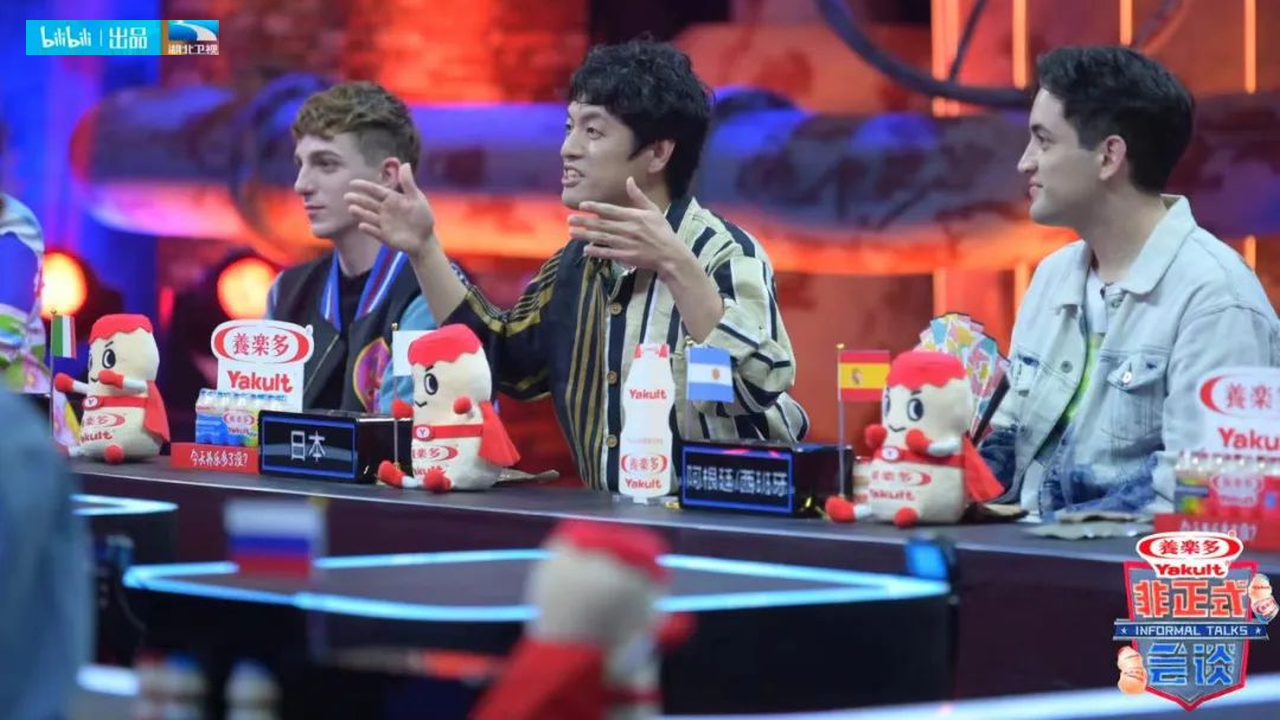
How to look at ‘Informal Talks’ through a knowledge management (KM) lens
Informal Talks1 is a global cultural talk show that is co-produced by China’s Hubei Satellite TV, Beep and Hubei Satellite TV. It was inspired2 by a world youth conference in 2015. It consists of 11 different nationalities discussing several topics in the form of mock talks, where each person represents a country and debates a specific topic without borders by combining the national characteristics of his/her country.
The core of it is to talk about a variety of topics popular with ordinary people through an informal and witty attitude and a spirit of banter. It features a variety of lively and interesting geography and humanities encyclopedias, as well as hot topics, which cover history, geography, folklore, literature, and famous people from all over the world. In addition, it would record the whole process of the talks and show the differences and commonalities of different cultures around the world to promote the exchange and collision of civilizations around the world.
1. KM practice in Informal Talks
Diversity
Our lecturer Rajesh Dhillon tells us that diversity is very important3 in the composition of an organization. Informal Talks is an extremely diverse talk show.
The first reason is that its guests are from different countries and have different educational backgrounds, for example, its panellist Hao Tahara is from Japan and was born in Chiba Prefecture; Bobo Hua is from Iran and graduated from Shanghai University with a degree in Chinese; Richard Pan is from Australia and graduated from Murdoch University, Australia; Gong Biyan is from Argentina and graduated from Beijing Language and Culture University; and Kim Han-il is from South Korea and graduated from Seoul University. Kim Han-yi is from South Korea and graduated from Seoul University. Akmao is from the United States. Mu Xiaolong is a guest from Egypt, majoring in Business English, so discussants from different countries with different educational backgrounds could help the audience increase the recognition and acceptance of different cultures and contribute to the realization of social diversity.
The second reason is that the members of these talks have different life experiences, as they all have different ages, family backgrounds and living conditions, which leads them to have different understandings and perspectives on life. For instance, Sasha started her business at the age of 15 to earn money to support her family, and she bought a house in Harbin, which made some of the ideas she discussed more realistic and helped the audience understand his views more deeply. On the contrary, Richard Pan had a rich parentage and a good family background, making his life experience smooth and smooth and making many of his speeches idealistic and unrealistic. Therefore, the audience can view the same issue from different cultural perspectives and disciplinary perspectives, which could help them broaden their knowledge and cultivate their critical thinking skills.
However, despite the cultural and life experience diversity of the panel guests, Informal Talks lacks female representation, which has been criticized by Chinese netizens4.
Lessons learnt
Lessons learnt5 is the process by which knowledge managers actively consider future actions and behaviours through lessons learned from past activities. And these lessons can include both successful practices and failures. In Informal Talks, participants share some of their life experiences and learning experiences when discussing some popular topics, which could help the audience understand their ideas directly. As an illustration, in season 3 episode 3, Yuan Chengjie shared his and his wife’s life experience and said,
“I used to do a lot of TV shows and I would have kissing scenes and big action with many good-looking actresses, which led to my wife telling me that she would like to believe that I wouldn’t cheat on her, but she doesn’t believe that those actresses wouldn’t seduce me.”
As well he tries to share all his passwords with his wife to increase trust between couples, specifically, he allows his wife to use his cell phone password to view his chatting records and enables her to view his bank card spending records to determine whether he has inappropriate behaviour with his female friends, which could effectively increase his wife’s trust in him. Hence, he teaches us to deal with the crisis of trust between couples by sharing some of his Lessons Learned from his previous life as a couple, which allows the viewer to understand his thoughts and learn from his life experiences in a short period.
Knowledge transfer
Knowledge transfer is the sharing or dissemination of knowledge to help people solve problems by organizing, creating, acquiring or disseminating knowledge and ensuring that the knowledge is available to future users. The Informal Talks is a typical interview on knowledge transfer, as the eleven discussants transfer the knowledge by sharing knowledge from different countries and various life experiences with the other members.
In season 3 episode 6, they discussed the topic “What kind of weird taxes do you have in your country?”, and Luo Jieshi, an American, made share that shared about this topic,
“The United States is a country where you have to pay a lot of taxes, and the taxes are different in each state. For instance, you have to pay a tax on sliced bagels in New York, an entertainment tax in Pittsburgh, a tax on blueberries as a valuable resource in Maine, a body piercing tax and a tax on grooming pets in Arkansas, and a tax on a scenic view of the ocean from your home in California, so the United States is a country where you have to pay a wide variety of outrageous taxes.”
Thus, he transferred his knowledge about U.S. taxes to audiences and other discussants through a discussion format that could help them understand U.S. Tax Policy, dodge some of the outrageous U.S. taxes and reduce travel costs when they choose to go to the U.S. for a vacation or business trip.
2. An excellent way to do knowledge sharing
Collaborative learning
Informal Talks is an excellent example of collaborative learning6, which has also been called decisions from deliberation7. Collaborative learning draws out and combines various perspectives and different types of knowledge. This involves carefully designed processes where different perspectives are combined and weighed up in a reasoned fashion, through an inclusive and transparent dialogue. Engaging multiple knowledges and multiple stakeholders in this way has been identified as very important for improving knowledge sharing in international development8,9.
Personal knowledge sharing
Informal Talks is also a good platform for stimulating personal knowledge sharing. The first reason is that knowledge could be spread through after-dinner discussions, as people like to discuss some hot topics involved in Informal Talks after dinner, which could help viewers subconsciously share the knowledge and ideas they learned from Informal Talks with their friends. To give an example, my good friend Alex would often discuss with me children’s day customs in different countries after our meals, and he would share some special knowledge and ideas raised in Informal Talks, which helped me to expand my knowledge and relax my study pressure.
The second reason is Informal Talk’s discussions are relaxed and harmonized, which could help viewers subconsciously absorb the knowledge, and it also could help people transfer information into knowledge and store it for a long time by sharing it with their friends and discussing it in the context of their real-life experiences. For example, my cousin will share some Informal Talks knowledge with me in my free time combined with her study experience, which could help her transform the information into knowledge and help me learn more. Thus, I believe Informal Talks is an excellent platform for encouraging personal knowledge sharing.
Article source: Adapted from How to look at ‘Informal Talks’ through a KM lens, prepared as part of the requirements for completion of course KM6304 Knowledge Management Strategies and Policies in the Nanyang Technological University Singapore Master of Science in Knowledge Management (KM).

Header image source: Sina.
References:
- Jiahui, S. (2017, March 24). Show of the week: Informal Talks. The World of Chinese. ↩
- Fan, X. (2022). Portrayal of Foreign Cultures in Chinese TV Program: A Case Study of Informal Talks. (Masters thesis). Graduate School of Bangkok University. ↩
- Boyes, B. (2017, September 29). Inclusion and diversity found to lead to better decision-making. RealKM Magazine. ↩
- Lujuba. (2021, April 26). “Informal Talks” is finalized, the trailer is full of creativity, but there is still no female representative. ↩
- Pearce, D. (2020).Lessons Learned Life Cycle. RealKM Magazine. ↩
- Harding, R., Hendriks, C., & Faruqi, M. (2009). Environmental Decision-Making: Exploring complexity and context. Sydney: The Federation Press. ↩
- Jones, H. (2011). Taking responsibility for complexity: How implementation can achieve results in the face of complex problems. Overseas Development Institute (ODI) Working Paper 330. London: ODI. ↩
- Cummings, S., Regeer, B. J., Ho, W. W., & Zweekhorst, M. B. (2013). Proposing a fifth generation of knowledge management for development: investigating convergence between knowledge management for development and transdisciplinary research. Knowledge Management for Development Journal, 9(2), 10-36. ↩
- Cummings, S., Kiwanuka, S., Gillman, H., & Regeer, B. (2018). The future of knowledge brokering, perspectives from a generational framework of knowledge management for international development. Information Development, https://doi.org/10.1177/0266666918800174. ↩




